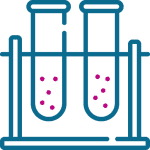Antistreptolysin-O (ASO) – quantitative test
The indicator is useful in detecting contact with streptococcal infection.
16,00 €

Antistreptolysin-O (ASO) is a quantitative test for suspected infection with group A streptococcus (bacteria). Streptococcus bacteria are the most common cause of sore throats, tooth abscesses and skin infections such as rosacea. It can also damage joints, the heart and kidneys.
If the body is now or has previously been exposed to streptococcal streptolysin O, then the serum concentration of antistreptolysin O increases. Streptococcus bacteria are the most common cause of sore throats, tooth abscesses and skin infections such as rosacea. It can also affect the joints, heart and kidneys – if these conditions are not diagnosed and treated in time, rheumatic fever and acute post-infectious glomerulonephritis can develop.
Approximately 80-85% of patients with acute rheumatic fever and 95% of patients with acute glomerulonephritis have elevated ASLO levels. Sometimes a false, unwanted increase in this indicator may be due to liver pathology or hyperlipidaemia. It is important to combine clinical and laboratory data when assessing antistreptolysin titres. Laboratory technologies using immunoturbidimetric methods are incomparably more accurate and have a much higher repeatability than previous titration techniques. Antistreptolysin-O (ASO) – a quantitative test to differentiate between rheumatism and rheumatoid arthritis, as rheumatoid arthritis patients have little or no increase in ASLO levels. Increases in this indicator can often help diagnose hidden, sluggish rheumatic processes and help assess the activity of the rheumatic process.
You can consult our family doctors.
